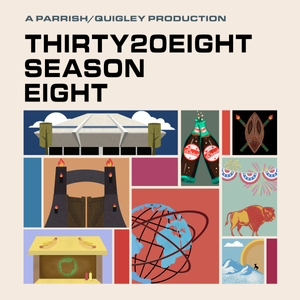
Cassie Chadwick Scammed the Gilded Age Elite Out of Millions and Convinced The World She Was Andrew Carnegie’s Bastard Daughter
03/24/22 • 52 min
By the time the police caught up to her she had wrecked the banking system of Cleveland, sending one unfortunate banker to his grave and causing the collapse of a major bank. When the trial was held it was a media event that pushed the trial of Teddy Roosevelt off the front pages with a climactic moment when Andrew Carnegie appeared to face his accuser. Cassie was eventually convicted but not before taking others with her and leaving a legacy as the biggest con woman in the United States only to be eclipsed by Charles Ponzi.
Today’s guest is William Hazelgrove, author of the book Greed in the Gilded Age: The Brilliant Con of Cassie Chadwick. We explore the excesses of this age, and the very thin line between radical reinvention and outright deception.
See omnystudio.com/listener for privacy information.
By the time the police caught up to her she had wrecked the banking system of Cleveland, sending one unfortunate banker to his grave and causing the collapse of a major bank. When the trial was held it was a media event that pushed the trial of Teddy Roosevelt off the front pages with a climactic moment when Andrew Carnegie appeared to face his accuser. Cassie was eventually convicted but not before taking others with her and leaving a legacy as the biggest con woman in the United States only to be eclipsed by Charles Ponzi.
Today’s guest is William Hazelgrove, author of the book Greed in the Gilded Age: The Brilliant Con of Cassie Chadwick. We explore the excesses of this age, and the very thin line between radical reinvention and outright deception.
See omnystudio.com/listener for privacy information.
Previous Episode

How China Changed Its Language From Archaic Confucian Bureaucracy to the Lingua Franca of Globalization
After a meteoric rise, China today is one of the world’s most powerful nations. Just a century ago, it was a crumbling empire with literacy reserved for the elite few, as the world underwent a massive technological transformation that threatened to leave them behind.
Today’s guest is Prof. Jing Tsu, author of “Kingdom of Characters: The Language Revolution that Made China Modern.” She argues that China’s most daunting challenge was a linguistic one: the century-long fight to make the Chinese language—with its many dialects and complex character-based script—accessible to the modern world of global trade and digital technology.
We discuss the connection between language and power, challenges China faced to ensure their language remained dominant/widespread, the innovators who adapted the Chinese language to a world defined by the West and its alphabet, AND it was so important for China to preserve its ancient character set, even though it was seen as such a hindrance to their technological development.
See omnystudio.com/listener for privacy information.
Next Episode

What “Dear John” Letters Tell Us About the Fragility of Wartime Relationships…and How They Unexpectedly Lead to Greater Camaraderie
During World War II nearly one billion letters were sent to the front, but none struck more fear in the heart of the average soldier than the one that began with the following: “Dear John: I don’t know quite how to begin but I just want to say that Joe Doakes came to town on furlough the other night and he looked very handsome in his uniform, so when he asked me for a date...” Such is an example of the “Dear John” letters that World War II G.I.s received from sweethearts or wives at home who had decided to politely, but unceremoniously, end their relationship. Though the phrase “Dear John” was coined during World War II and the break-up letters have found their way into every American war since then, the exact origins of the term have always been shrouded in obscurity.
In her new book Dear John: Love and Loyalty in Wartime America, historian and today’s guest Susan L. Carruthers details the history of the “Dear John” letter and explores wartime relationships and breakdowns from multiple perspectives—civilian and military, male and female, historical and contemporary. Using a diverse range of research, using personal letters, declassified documents, press reports, psychiatric literature, movies, and popular music, Carruthers also shows how the armed forces and civilian society have attempted to weaponize romantic love in pursuit of martial ends, from World War II to today. Though many U.S. officers, servicemen, veterans, and civilians would agree that “Dear John” letters are lethal weapons in the hands of men at war, Carruthers explains that efforts to discipline feelings have frequently failed. We discuss the interplay between letter-writing and storytelling, breakups and breakdowns, and between imploded intimacy and boosted camaraderie. Incorporating vivid personal experiences in lively and engaging prose—variously tragic, comic, and everything in between—this compelling study will change the way we think about wartime relationships.
As Carruthers explains, “Making romantic intimacy serve the cause of victory has never been straightforward for the military. Nor has making love work in wartime been simple for individuals and couples. The reasons why can be discerned by reading the subtexts and contexts of ‘Dear John’ letters, and by listening attentively to what men and women have had to say about the fragility of love at war.”
See omnystudio.com/listener for privacy information.
If you like this episode you’ll love
Episode Comments
Featured in these lists
Generate a badge
Get a badge for your website that links back to this episode
<a href="https://goodpods.com/podcasts/history-unplugged-podcast-1143/cassie-chadwick-scammed-the-gilded-age-elite-out-of-millions-and-convi-20085752"> <img src="https://storage.googleapis.com/goodpods-images-bucket/badges/generic-badge-1.svg" alt="listen to cassie chadwick scammed the gilded age elite out of millions and convinced the world she was andrew carnegie’s bastard daughter on goodpods" style="width: 225px" /> </a>
Copy




